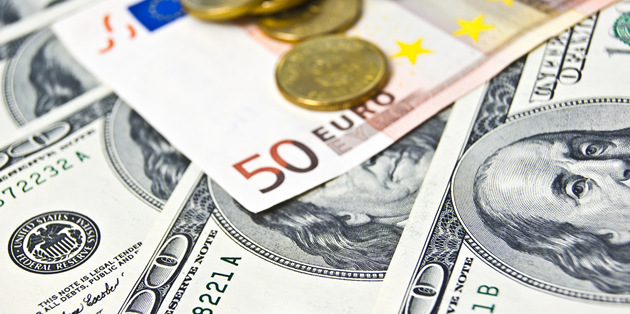- UPDATE: International Monetary Fund (IMF) wants Greek debt relief until 2040
- UPDATE: USD Remains Soft after New York Manufacturing Slump
- Investors Confident on Greek Deal – Bond yields drop in anticipation of agreement
- Moody’s Raises Ireland’s Credit Rating – Economy improving faster-than-expected
- Weak Chinese Data Cuts Fed Rate Hike Bets – Just 4% probability of rate hike in June
- Forecast: US CPI to Provoke EUR/USD Volatility
IMF Throws Fresh Spanner in the Works of Greek Bailout Negotiations
With just a few days to go before the next meeting to discuss the Greek bailout, the International Monetary Fund (IMF) has further complicated negotiations on debt relief for the stricken Hellenic nation. In exchange for its participation as a lender in the Greek bailout programme, the IMF is looking for Eurozone creditors to agree to debt relief measures lasting until 2040. Under the proposals, which would keep Greek debt below 15% of GDP, interest rates on Greek loans would remain fixed at 1.5% and interest payments would not be made until the loans are due. Under the plan, all of Greece’s loans would staggered in order to fade out gradually by 2080. This goes much further than what Eurozone creditors have suggested they are willing to do to help Greece, creating another obstacle on the road to reaching an accord.
Yesterday…
The latest NY Empire State Manufacturing Index has revealed a surprise slump in production during May. Although a decline in the rate of growth to 6.50 was expected, the index dropped from 9.56 to -9.02. While not a major economic indicator, the measure of manufacturing activity in New York highlights the continuing struggle of the overall US manufacturing sector.
Earlier…
A positive outlook for Ireland and Greece has helped firm the EUR/USD exchange rate today. The Euro (EUR) has made small gains thanks to comments from ratings agency Moody’s and Greek Prime Minister Alexis Tsipras. Meanwhile, the US Dollar is soft after poor Chinese data was released over the weekend.
Ireland Credit Rating Upgrade and Greek Deal Hope Boosts Euro (EUR)
The Euro, while still weak overall on concerns of more ECB easing, has ticked higher against the US Dollar (USD) today. The markets are becoming more positive that the current Greek bailout negotiations can be completed before the next bailout meeting between Eurozone finance ministers is held on the 24th of May.
Greek 10-year bond yields have dropped to their lowest level this year, meaning that bond prices have risen. Lower yields and higher prices indicate market confidence in the government’s ability to repay the debt issued.
According to SEB AB’s Head of Macro and Fixed-Income Research, Jussi Hiljanen;
‘Greece yields suggest there is confidence in the market that a solution can be found even in difficult situations because that’s what happened in the past. There seems to be a perception in the market, which I share, that there is political willingness to keep the country on board.’
Greek Prime Minister Alexis Tsipras has even forecast that the country could re-enter the bond market next year, which he claims could help them exit the bailout programme before it is due to finish in 2018.
Good news from Ireland – a former recipient of Eurozone bailout funding – has also helped keep the common currency strong against the ‘Greenback’. Credit rating agency Moody’s upgraded Ireland’s long-term bond ratings one step, from Baa1 to A3. This means that the agency has more confidence in the Irish government’s ability to repay the debt it issues; bond yields (which move conversely to prices) already hit a four-week low as markets anticipated Moody’s decision.
‘Ireland’s key credit fundamentals have continued to improve at a faster pace than expected even a few months ago, including a stronger economic recovery and a more marked reduction in the public debt ratio,’ Moody’s noted.
However, another credit ratings agency has warned that Ireland, along with Belgium, Cyprus, Luxembourg, Malta and the Netherlands, could risk a cut to their credit ratings in the event of a ‘Brexit’.
‘Brexit would create a precedent for countries leaving the EU. It could boost anti-EU or other populist political parties and make EU leaders more reluctant to implement unpopular policies with long-term economic benefits. Negotiating the terms of the UK’s exit could exhaust the EU’s time and energy and open up new fronts of disagreement,’ Fitch has warned.
US Dollar (USD) Weakens as Poor Chinese Data Lowers Fed Rate Hike Expectations

Disappointing data from China over the weekend has lessened hopes of a rate hike from the Federal Reserve next month. Industrial production remained stagnant on a year-to-date (YTD) basis, while year-on-year (YoY) growth slowed from 6.8% to 6% instead of slipping to 6.5% as forecast. YTD retail sales growth also remained level, while YoY sales slipped from 10.5% to 10.1%, rather than ticking up to 10.6%.
The results have firmed belief that the Federal Reserve will not be raising interest rates during June’s policy meeting. Fed funds futures currently show a 96% probability that rates will be left on hold, with a rate hike only becoming more probable than a hold in December, with a 42% chance of a 0.25% increase and 15% chance of a 0.50% hike.
Euro to US Dollar (EUR/USD) Exchange Rate Forecast: Central Bankers and US CPI to Provoke Volatility
There is no high-impact data due out for either the Eurozone or the US today, so it is likely that market sentiment will continue to drive EUR/USD movement. Tomorrow, however, several central bankers are due to speak, including the ECB’s Peter Praet and the Fed’s Neel Kashkari, John Williams, Dennis Lockhart and Robert Kaplan.
Also key for the US Dollar tomorrow is the Consumer Price Index figures for April. The core index is expected to have ticked marginally lower on the year and higher on the month, while the non-core index is predicted to show an acceleration in growth, with both the monthly and yearly figures increasing 0.2% to 1.1% and 0.3% respectively.
The Euro to US Dollar (EUR/USD) exchange rate is trending between 1.1301 and 1.1331, while the US Dollar to Euro (USD/EUR) exchange rate is trading between 0.8825 and 0.8844.



